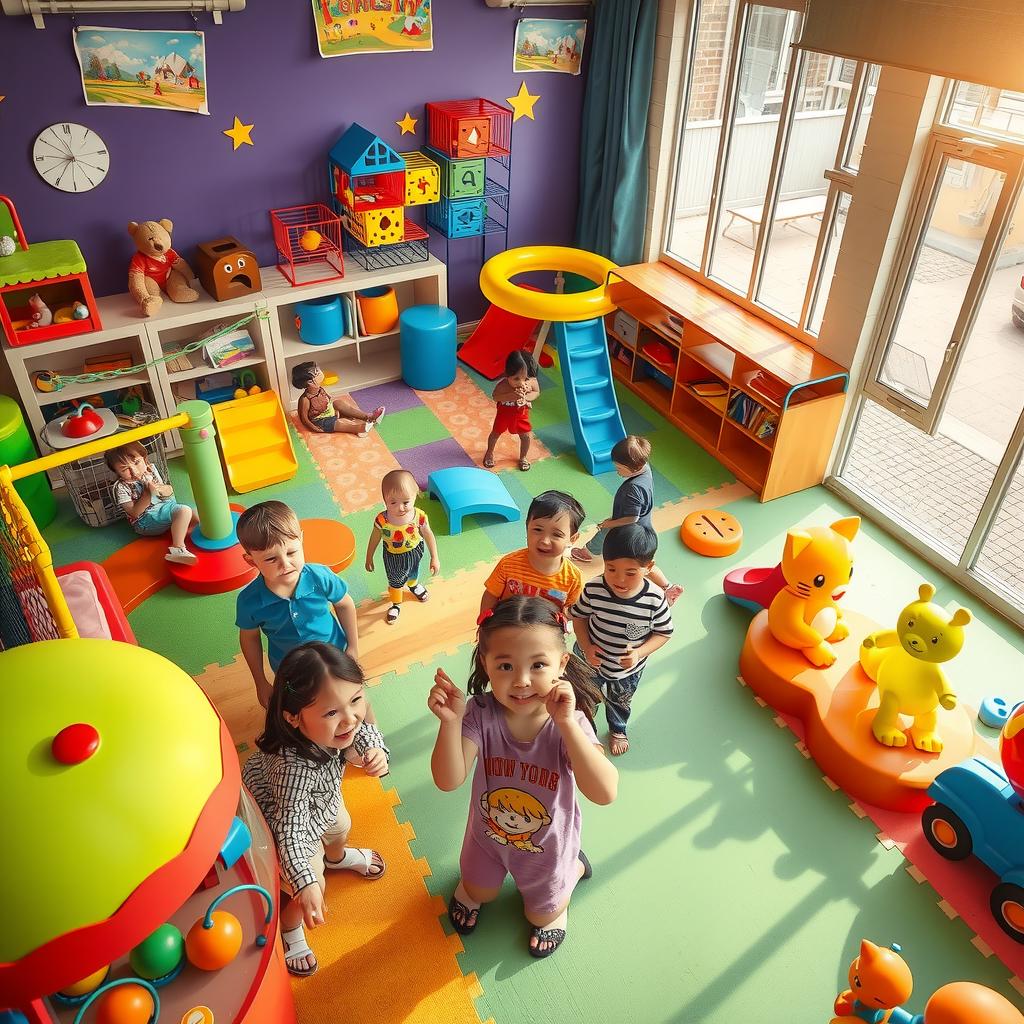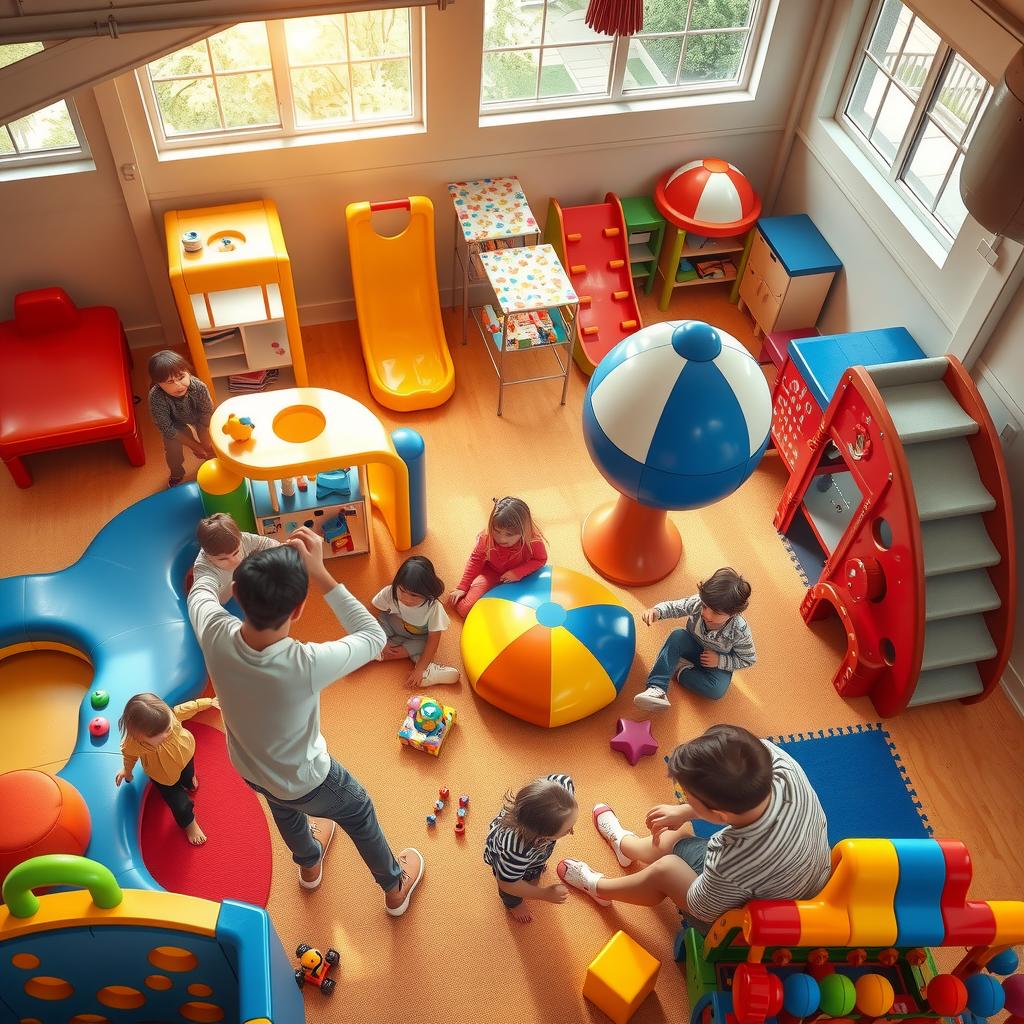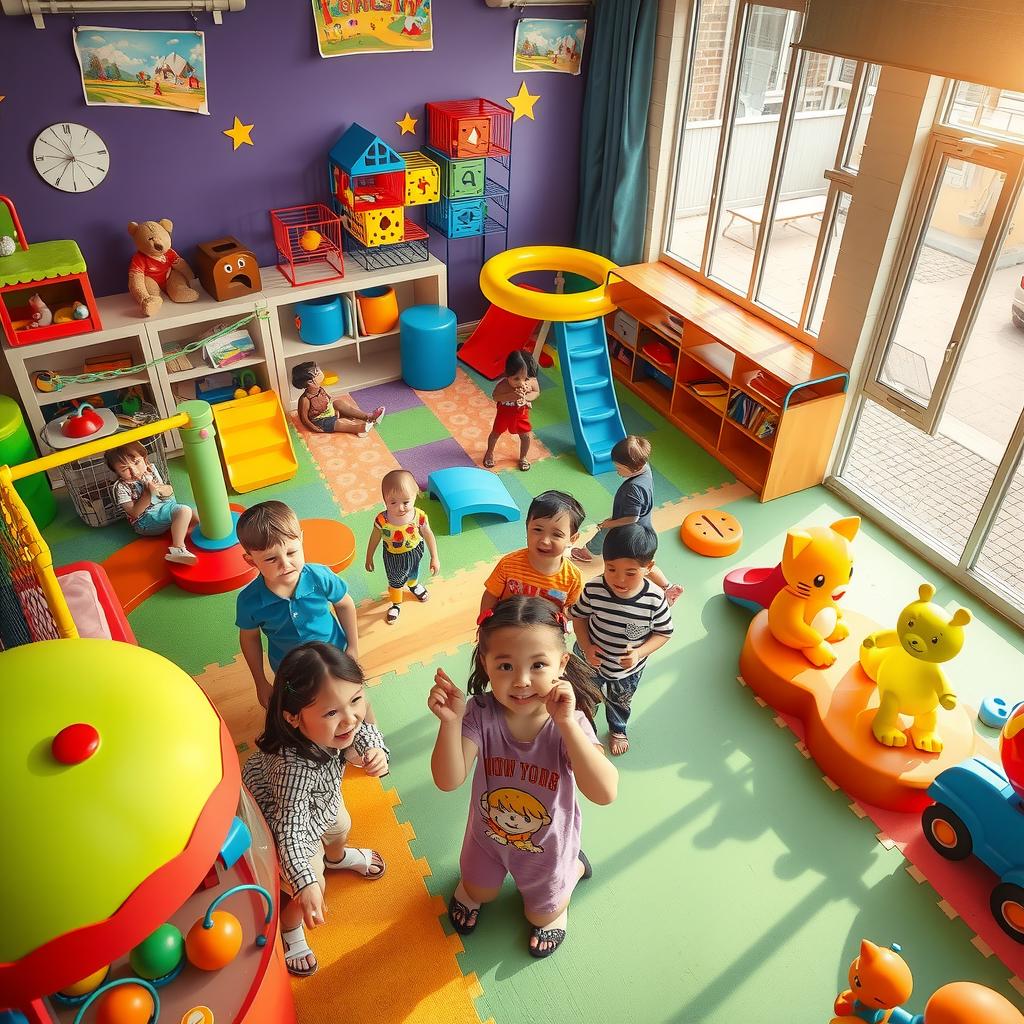In a world increasingly dominated by screens and structured activities, many parents find themselves grappling with a pressing question: How can they foster their children’s emotional development amidst these challenges? The answer may lie in an often-overlooked environment—Indoor Playgrounds. These vibrant spaces are more than just places for physical activity; they serve as vital arenas where children engage in indoor play, nurturing essential life skills that contribute to their overall emotional growth. Through the lens of child psychology, it becomes evident that these playgrounds offer unique opportunities for sensory play, social interactions, and creative expression that traditional settings cannot provide.
As children navigate the various structures within Indoor Playgrounds, they encounter scenarios that promote problem-solving and resilience—key components of healthy emotional development. The act of climbing, sliding, or even playing pretend allows young minds to explore boundaries while boosting self-esteem through achievement. As youngsters interact with peers in this dynamic setting, they also learn crucial social skills such as cooperation and empathy. These experiences not only enhance their ability to connect with others but also lay the foundation for strong relationships throughout life.
Moreover, the design elements found in Indoor Playgrounds encourage imaginative thinking and exploration. Bright colors stimulate visual senses while varied textures invite tactile engagement—all integral aspects of sensory play that support cognitive functions and emotional regulation. This combination creates an enriching atmosphere where creativity flourishes alongside physical activity.
The developmental benefits associated with indoor play extend far beyond mere entertainment; they address a fundamental need for balanced growth during formative years. By immersing themselves in well-structured environments like Indoor Playgrounds, children are better equipped to handle life’s complexities as they transition into adulthood—making it imperative for caregivers to recognize the importance of integrating such facilities into their child’s routine.
This article will delve deeper into how Indoor Playgrounds specifically cater to fostering children’s emotional health through engaging activities designed around child psychology principles—a compelling narrative sure to resonate with parents eager for effective solutions in today’s fast-paced world.

Key Points:
-
Nurturing Emotional Skills Through Play: Engaging in Indoor Playgrounds allows children to explore their feelings and develop emotional intelligence. Research indicates that play is essential for emotional development, as it provides a safe space for children to express themselves.
-
Fostering Creativity and Social Interaction: The imaginative environments of Indoor Playgrounds encourage creative expression while also enhancing social skills. Children learn to navigate relationships through collaborative play, which builds teamwork and problem-solving abilities.
-
Diverse Forms of Engagement: The unique design of Indoor Playgrounds accommodates various types of play, catering to different interests. This multifaceted approach supports overall developmental benefits by promoting both active physical engagement and quieter sensory exploration.

The Role of Play in Emotional Growth
Understanding the Significance of Play for Children’s Development
Play is not merely a pastime for children; it serves as a fundamental pillar in their emotional development. Engaging in play, particularly within Indoor Playgrounds, offers myriad benefits that extend far beyond mere enjoyment. During these playful interactions, children navigate a variety of experiences that foster essential skills such as empathy and resilience. Psychological studies have emphasized that through play, children learn to express their emotions creatively—whether they are imitating real-life scenarios or creating fantastical worlds. This type of sensory play allows them to explore their feelings and reactions safely, providing an environment where emotional expression is encouraged without fear of judgment.
The importance of social skills cannot be overstated during these formative years. In settings like Indoor Playgrounds, kids interact with peers from diverse backgrounds, learning how to communicate effectively and build relationships based on trust and cooperation. These environments facilitate collaborative games which require negotiation and compromise—skills critical for future interpersonal success. Moreover, when faced with challenges during playtime, whether it’s sharing toys or resolving conflict over game rules, children develop problem-solving abilities that contribute significantly to their emotional intelligence.
Furthermore, the developmental benefits associated with structured yet flexible play environments promote creative expression among young learners. Within the confines of an Indoor Playground, imaginative scenarios unfold where children can act out various roles—from superheroes saving the day to explorers on daring adventures—each scenario serving as a rehearsal for real-life situations they might encounter later on. Such role-playing helps them process complex emotions by allowing them to step into someone else’s shoes momentarily.
In addition to enhancing social interaction and creativity, engaging in physical activity through indoor games contributes positively towards reducing anxiety levels among children—a crucial aspect linked directly to mental health awareness today. By immersing themselves in active gameplay within safe spaces like Indoor Playgrounds, youngsters channel excess energy while simultaneously cultivating a sense of accomplishment upon mastering new skills or overcoming obstacles encountered during playtime.
Ultimately, understanding child psychology reveals why nurturing environments featuring ample opportunities for varied forms of indoor play are indispensable tools for fostering healthy emotional growth among youth populations today; promoting self-awareness alongside strengthening peer connections aids tremendously in shaping resilient individuals ready to tackle life’s inevitable hurdles head-on.
Exploring Emotional Expression Through Interactive Learning
How Indoor Spaces Encourage Emotional Connections
Interactive learning experiences found within specially designed spaces such as Indoor Playgrounds provide unique avenues for exploring children’s emotional landscapes more deeply than traditional educational settings often allow. Through engaging activities tailored toward sensory exploration and imaginative interaction processes inherent therein help bridge gaps between theoretical knowledge about feelings versus practical applications experienced firsthand by little ones navigating cooperative tasks together—the profound nature behind this phenomenon cannot be overlooked!
Children naturally gravitate towards shared adventures filled with laughter while embarking upon thrilling journeys involving teamwork-based exercises seen often at local playgrounds dedicated solely toward encouraging interactive fun! As they engage enthusiastically alongside friends striving toward common goals ladened throughout those exhilarating pathways leading upward & downward across each level built purposely designed around maximizing entertainment value blended seamlessly right alongside developing meaningful connections forged amidst spontaneous moments arising spontaneously out-of-the-blue!
By participating fully immersed inside bustling arenas buzzing alive vibrantly colored walls adorned beautifully showcasing characters inviting all comers eager join forces proceed happily onward gain insights previously inaccessible unless pursued via direct involvement openly fostering stronger bonds formed amongst peers ensuring lasting ties remain intact even outside confines thereof dedicated zones established primarily serve purpose enriching lives exponentially increasing overall satisfaction felt universally echoed echoed throughout entire community surrounding areas nearby promoting holistic well-being enhanced greatly simply being involved actively present enjoying time spent laughing playing imagining freely unencumbered limits imposed elsewhere creating unforgettable memories cherished lifetime long ahead paved bright futures awaiting eagerly waiting take flight soar high skies limitless potential unfolding before eyes gazing wide wonderment excitement discovery reign supreme here joyous occasions celebrated regularly fueling spirits uplifted immensely blissful exhilaration radiating warmth hearts everywhere touched profoundly forever changed journey embarked upon collectively shared amongst countless souls united happiness joyfully coming together celebrating triumphs big small alike evoking nostalgia reverberating echoes fondly reminisced fondly recalled always treasured dearly held tightly close heart’s embrace eternally intertwined destinies entwined inseparably forevermore bound lovingly connected spirit friendship laughter love guiding light illuminating paths walked hand-in-hand side-by-side every step way undertaken boldly forward forging ahead brighter tomorrow awaits patiently beckoning forth eager participants ready unleash fullest potential await realization dreams made manifest someday soon find fruition blossom bloom brightly illuminate world around shining brilliance touching countless lives enriching existence altogether one beautiful masterpiece created collaboratively woven tapestry life unfolds wondrous ways unexpected delightful surprises await discovery treasures hidden depths seeking uncover unravel deep mysteries soul’s essence revealed blossoming beneath surface calm waters stirred gently rippling waves thoughts emotions converging harmoniously forming intricate patterns radiate pure joy fulfillment create lasting legacies celebrated generations come fulfilling destiny awaited anxiously anticipated eagerly embraced wholeheartedly welcomed warmly open arms enveloping love embracing kindness compassion expressed freely shared abundantly spread widely nurture nourish grow
Indoor Playgrounds: Cultivating Creativity and Connection
Fostering Imagination Through Engaging Environments
Indoor playgrounds serve as vibrant arenas where children can unleash their creativity while simultaneously honing essential social skills. These unique spaces are designed to stimulate bold imaginative play, allowing young minds to explore various scenarios that reflect their thoughts and emotions. In the realm of child psychology, it becomes evident that such environments not only promote physical activity but also foster emotional development through sensory play experiences. For instance, climbing structures may encourage risk-taking within a safe context, an important aspect of building confidence in social interactions.
Moreover, indoor playgrounds offer opportunities for collaborative play—where children can engage with peers in shared activities. This interaction is crucial for developing social skills such as communication and negotiation. As kids navigate through intricate mazes or work together on group challenges, they learn vital lessons about teamwork and empathy. The importance of these developmental benefits cannot be overstated; research highlights that early positive peer interactions lay the foundation for future relationship-building abilities.
The design elements of indoor playgrounds are intentionally crafted to enhance creative expression among children. Bright colors, imaginative themes (like jungle safaris or space adventures), and varied textures engage multiple senses at once—inviting children into worlds limited only by their imaginations. Such environments provide a break from traditional learning settings by merging fun with educational growth; this playful approach resonates well with contemporary educational philosophies advocating experiential learning.
Furthermore, engaging in indoor play facilitates cognitive development as children encounter new challenges that require problem-solving skills and adaptability. Whether navigating obstacle courses or participating in role-playing games, each experience enriches their understanding of themselves and others around them—a cornerstone for emotional intelligence.
In conclusion, indoor playgrounds embody more than just a place for recreation; they act as nurturing grounds where imagination flourishes alongside critical interpersonal competencies. By emphasizing both fun and functionality within these creative spaces, parents can ensure their children’s formative years are filled with enriching encounters that prepare them not only academically but socially—as they venture forth into the world equipped with robust social skills, creativity levels heightened through rich experiences found uniquely in these dynamic playgrounds.
The Transformative Power of Indoor Playgrounds
Nurturing Emotional Development Through Play
The significance of Indoor Playgrounds extends far beyond mere recreation; they serve as vital spaces for emotional growth and interpersonal skill development in children. Engaging regularly in these vibrant environments allows children to explore their emotions through play, which is a natural medium for expressing feelings that may be difficult to articulate verbally. Research indicates that sensory play, often found in Indoor Playgrounds, promotes cognitive and emotional development by providing varied stimuli that can enhance children’s ability to process their surroundings. This stimulation fosters resilience, allowing kids to navigate challenges within a safe space where trial and error are encouraged.
Moreover, the social dynamics present in Indoor Playgrounds contribute profoundly to the cultivation of social skills among young patrons. Children learn cooperation, negotiation, and conflict resolution while interacting with peers during various games and activities. These interactions not only bolster friendships but also create lasting bonds built on shared experiences. As children engage in collaborative tasks or group play scenarios within these playgrounds, they develop essential interpersonal skills that will benefit them throughout life—making them more empathetic individuals who understand the importance of teamwork.
Additionally, frequent visits to Indoor Playgrounds have been linked with improved self-esteem among children. By achieving goals—whether it’s conquering an obstacle course or mastering a new climbing technique—they gain confidence in their abilities. This boost translates into other areas of life such as academic performance and social interactions at school. When children feel good about themselves emotionally, they are more likely to form positive relationships with others.
In essence, while many view indoor play primarily as entertainment or physical exercise opportunities for kids, its impact on child psychology is profound and long-lasting. The multi-faceted developmental benefits offered by regular engagement with Indoor Playgrounds weave together strands of creativity and imagination alongside critical emotional intelligence components necessary for healthy adult relationships later on in life.
Building Bridges: Social Skills Enhancement
Fostering Connections Through Shared Experiences
The role of Indoor Playgrounds extends into the realm of enhancing children’s social skills significantly through shared experiences fostered during playful activities. In these lively settings filled with laughter and excitement, children encounter numerous opportunities for interaction that encourage cooperative behaviors essential for forming friendships. For instance, when two kids decide to tackle a climbing wall together or share toys during imaginative play sessions within an indoor playground, they practice communication skills like taking turns and sharing ideas—fundamental elements required for successful peer relationships outside this environment.
Furthermore, engaging consistently within diverse groups at Indoor Playgrounds exposes children to varying personalities which helps them adapt socially across different situations—a crucial element reflected positively both academically and personally later on in life as they navigate classroom dynamics or extracurricular engagements successfully without feeling overwhelmed by unfamiliarity around new peers.
Research has shown how vital early childhood interactions can shape future relational patterns; hence promoting exposure via interactive platforms like indoor playgrounds becomes imperative from formative years onwards since it lays groundwork towards developing empathy—a cornerstone trait tied closely with effective communication endeavors throughout adulthood too! Thus ensuring each child’s experience revolves around learning valuable lessons wrapped cleverly amid fun-filled moments ultimately primes youngsters not just physically but emotionally equipped too!
In summary then—the transformative influence exerted upon our youth courtesy well-structured indoor playgrounds cannot be understated! They become fertile grounds nurturing tomorrow’s compassionate leaders capable enough handling complexities arising adeptly driven largely because they’ve learned through joy-filled mingling amidst playful escapades today!
Lasting Impacts: Emotional Resilience Development
Strengthening Coping Mechanisms Through Active Engagement
Delving deeper into how regular participation at Indoor Playgrounds facilitates emotional resilience showcases yet another dimension contributing towards holistic childhood development naturally intertwined alongside recreational enjoyment experienced therein daily! The rhythmic flow between physical activity coupled harmonious surroundings encourages kids let loose inhibitions confidently express genuine feelings without fear judgment typically encountered elsewhere sometimes makes navigating tough emotions daunting especially given pressures faced growing up today continuously rising due societal expectations surrounding young minds nowadays understandably so!
When immersed actively amidst colorful structures designed specifically promote exploration movement freely under gentle supervision provided here (as opposed rigid confines classrooms), youngsters discover novel ways cope frustration stemming inevitably unpredictable outcomes inherent competition sportsmanship fairness concepts introduced subtly thereby fortifying mental frameworks previously lacking perhaps even fostering healthier perspectives overall regarding winning losing alike effectively balancing realism aspirations grounded roots strong foundations formed earlier aforementioned collaborative efforts undertaken routinely exchanging thoughts opinions forging trust networks cultivated steadily over time solidifying bonds cherished deeply amongst friends family members alike eventually leading fulfilling lives ahead…
Thus embracing comprehensive approach integrating principles governing child psychology seamlessly harmonizes perfectly aligning intrinsic drives innate desires explored fully enjoyed ultimately paving paths toward brighter futures characterized higher levels satisfaction contentment derived simply being part larger community united goal striving thrive collectively rather independently isolated journeys taken alone instead further empowering individuals stand firm face adversities gracefully knowing armed tools acquired nurtured lovingly right age all thanks said enriching experiences gathered rich tapestry woven together aptly portrayed majestic realms encapsulated wondrous worlds hidden behind walls every single visit make count truly
Frequently Asked Questions:
Q: How do Indoor Playgrounds contribute to a child’s emotional development?
A: Indoor Playgrounds provide an environment where children can engage in various forms of play, promoting their emotional growth. Through sensory play and imaginative scenarios, these spaces allow children to explore their feelings while interacting with others. The experiences gained from climbing, sliding, and problem-solving together foster essential social skills that are crucial for navigating relationships throughout life.
Q: What types of activities in Indoor Playgrounds enhance social skills?
A: Activities such as cooperative games and team challenges within Indoor Playgrounds encourage children to work together, share ideas, and communicate effectively. These playful interactions not only strengthen friendships but also teach cooperation and empathy—key components of developing strong social skills. By participating in both active physical engagement and quieter imaginative exploration, children learn valuable lessons about relating to others.
Q: Why is it important for parents to prioritize visits to Indoor Playgrounds?
A: Regular visits to Indoor Playgrounds offer numerous developmental benefits for children. These vibrant settings foster creativity through free expression while also providing safe opportunities for emotional exploration. The multifaceted approach found in these environments supports all aspects of childhood growth by allowing kids the freedom to express emotions—whether joy during play or frustration when facing obstacles—which ultimately shapes their future emotional landscapes positively.

